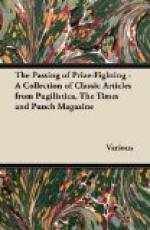A SIGNIFICANT STEP.
The Evening Post’s Washington correspondent states: “Mr. Lloyd George’s speech at Glasgow is a significant step in the process of winning the war by liplomatic strategy.”—Sydney Daily Telegraph.
There’s many a slip ’twixt the dip and the lip; but “liplomatic” is not a bad word.
* * * * *
THE MUD LARKS.
Nobody out here seems exactly infatuated with the politicians nowadays. The Front Trenches have about as much use for the Front Benches as a big-game hunter for mosquitoes. The bayonet professor indicates his row of dummies and says to his lads, “Just imagine they are Cabinet Ministers—go!” and in a clock-tick the heavens are raining shreds of sacking and particles of straw. The demon bomber fancies some prominent Parliamentarian is lurking in the opposite sap, grits his teeth, and gets an extra five yards into his bowling.
But I am not entirely of the vulgar opinion. The finished politician may not be a subject for odes, but a political education is a great asset to any man. Our Mess President, William, once assisted a friend to lose a parliamentary election, and his experience has been invaluable to us. The moment we are tired of fighting and want billets, the Squadron sits down where it is and the Skipper passes the word along for William. William dusts his boots, adjusts his tie and heads for the most prepossessing farm in sight. Arrived there he takes off his hat to the dog, pats the pig, asks the cow after the calf, salutes the farmer, curtseys to the farmeress, then turning to the inevitable baby, exclaims in the language of the country, “Mong Jew, kell jolly ong-fong” (Gosh, what a topping kid!), and bending tenderly over it imprints a lingering kiss upon its indiarubber features and wins the freedom of the farm. The Mess may make use of the kitchen; the spare bed is at the Skipper’s disposal; the cow will move up and make room for the First Mate; the pig will be only too happy to welcome the Subalterns to its modest abode.
Ordinary billeting officers stand no chance against our William and his political education. “That fellow,” I heard one disgruntled competitor remark of him, “would hug the Devil for a knob of coke.” Once only did he meet his match, and a battle of Titans resulted.
In pursuit of his business he entered a certain farm-house, to find the baby already in possession of another officer, a heavy red creature with a monocle, who was rocking the infant’s cradle seventy-five revolutions per minute and making dulcet noises on a moustache comb.
William’s heart fell to his field boots; he recognised the red creature’s markings immediately. This was another politician; no bloodless victory would be his; fur would fly first, powder burn—Wow!
The red person must have tumbled to William as well, for he increased the revolutions to one hundred and forty per minute and broke into a shrill lullaby of his own impromptu composition:—




